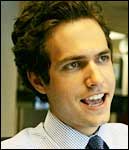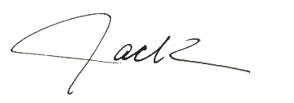The Day Time Really Did Stop
in Kansas City

Tune in for what's new in Kansas: It's a web-based news site, and regularly published journal, dedicated to limited government in the great state of Kansas. |
![]()
by Jack Cashill
Published in ingramsonline.com - October 2010
hen the grand poo-bahs from the great media empires of the east set out to find out what middle America is thinking, you can bet they're really looking for confirmation of what they suspect is wrong with us.
The literal “Time” reference in the title of this missive is to Time magazine, a few of whose luminaries stopped in Kansas City one day recently for some barbecue and back-patting.
The metaphoric reference is to that illusory hour or two when time did seem to stop, and the aforementioned muckety-mucks could delude themselves into thinking that what they said and did still mattered.
A friend had wangled a pair of invites to the barbecue and asked me along. He was under the impression, as were other guests with whom I spoke, that the event was designed to let the Time people take the pulse of Mid-America. We would soon learn otherwise.
Upon arriving at the Terrace, a swell place on Grand Boulevard, we were given personalized “Time Magazine” nametags and were ushered to an elevator where a hostess met us holding a tray of wine glasses. “Hmmm,” I thought, “barbecue and wine.”
The elevator took us to a rooftop terrace. As soon as I saw the 100-plus guests, I sensed that this was not exactly the intimate idea exchange I had envisioned. Nor did the guests exactly reflect the throbbing political pulse of our contiguous red states.
The largest single block of invitees had wandered down from 18th & Grand, the colonial outpost of the NY/DC media known as The Kansas City Star. In attendance, too, were corporate lawyers, high-profile business people, and a fair number of folks from the non-profit sector. I also saw several people I knew from UMKC, a few of whose pulses, I can personally attest, beat more like those in Cuba than those in Kansas.
Reasons to Hope
My mood changed abruptly for the better when I discovered that, yes, there was beer. Wandering around with Bud Light in hand, I was approached by a woman who told me how much she liked Time Magazine. “You guys do such great work,” she enthused.
“We guys?” I said. Thinking me merely coy, she pointed to the “Time” logo on my nametag. Were I on the prowl, I might have played this out, but instead I pointed to the “Time” logo on her nametag and instantly rendered myself much less amusing and attractive. She wandered off.
 I spotted a politically simpatico friend, one of the few on the roof, and drifted over. In his grouping was a diffident little twenty-something whose nametag identified him as “Arthur Sulzberger”(at left).
I spotted a politically simpatico friend, one of the few on the roof, and drifted over. In his grouping was a diffident little twenty-something whose nametag identified him as “Arthur Sulzberger”(at left).
“You must be related,” I said. He confessed that his family was not terribly imaginative in assigning names. Young Arthur G. Sulzberger is the son of New York Times publisher Arthur O. Sulzberger, the grandson of the late New York Times publisher, Arthur O. Sulzberger, and the great grandson of the even later New York Times publisher, Arthur H. Sulzberger.
But . . . Why Here?
As Arthur explained, he had recently arrived in Kansas City to open a Times’ Kansas City bureau. “A Kansas City bureau?” I might have asked a few beers down the road. “What? Did you wreck the old man’s Bentley?”
The assignment had the whiff of exile about it. “Arthur may be hard-pressed to find vegetarian food amid all the barbecue joints, but he’ll have no trouble finding stories,” read the sad little news release announcing his new post. “He has an eye for spotting unusual and compelling tales, and bringing them to life with deep reporting and lively writing.”
That same week our vegetarian friend had published his first deep and lively tale with a Kansas byline. It made page A16 of the Times and detailed how a retired postman in Mulvane, Kan., had built a replica of the Golden Gate Bridge over a creek near his house—10 years prior. The story came complete with a swell map of the Wichita area.
After being ushered downstairs for some hearty Oklahoma Joe’s—a tough night for young Arthur—Time’s editor-in-chief, John Huey, led with the oddball assurance that Time was not at all the liberal, out-of-touch, elitist media publication Kansas Citians might think it to be.
Then, as if to disprove his own blarney, Huey introduced the evening’s guest of honor, the “legendary” Time reporter, Joe Klein. A product of the Hackley School and the University of Pennsylvania, Klein had left New York 16 days prior on his “Election Road Trip 2010” to meet ordinary Americans in their native habitats and, yes, “take the pulse of the nation.”
In reality, Klein has no more feel for that benighted land west of the Hudson than does young Arthur. Earlier, he had dismissed the Republican base as “maniacs” and would a day later visit the “twisted little world” of Sarah Palin. This wasn’t reporting. This was agitprop.
And yet his bosses, like Arthur’s, cling to the 19th-century notion that these utterly predictable, second-drawer Ivy Leaguers—Sulzberger went to Brown—could tell us something about ourselves so valuable we would want to purchase it at a newsstand.
Sadder still, the myopic folks at The Star feel safer repeating what they read in Time or the Times than reporting the world as it exists around them. In the age of the Internet, when real people do real reporting and don’t charge for it, this business model does not exactly make for robust stock prices.
Klein apparently has not gotten the memo. He has been driving around the country, running over what few Time customers remain in the middle-of-road. When I learned that he was to be the evening’s entertainment—a second Time reporter was to interview him—I gulped down my Oklahoma Joe’s and quietly exited.
I should have stuck around. As Klein would report, a woman in this otherwise polite audience, a “Show-Me spitfire,” actually challenged him. So rare was this “blast of incivility” that Klein called it “stunning.” He has encountered so few challenges for one obvious reason: he prefers to talk to people who believe as he does or can be easily bullied into silence.
I only wish Klein could have sat in on Ingram’s Industry Outlook last month to tell area bankers why they were wrong to condemn the Dodd-Frank bill or, the month before that, to tell area health-care leaders why they were wrong to worry about Obamacare.
Now that, I would have stuck around to see.


